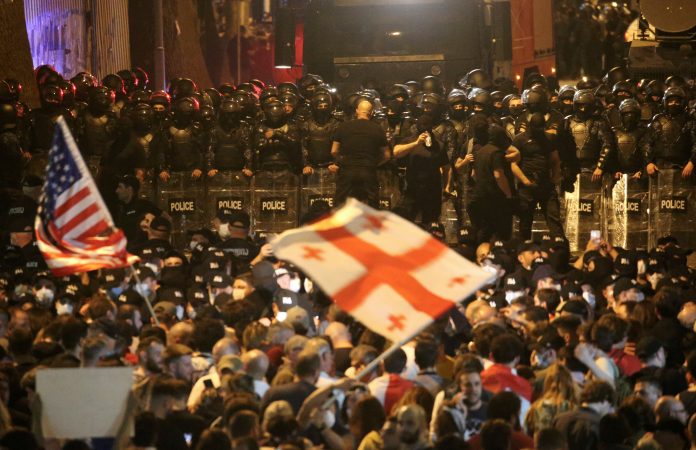Georgian security forces used water cannons, tear gas and stun grenades against protesters outside parliament late Tuesday night, sharply stepping up repression after lawmakers debated a draft law on “foreign agents” that the opposition and some Western countries say is aimed at curtailing press freedom.
The bill requires non-profit organisations and media outlets that receive 20 percent or more of their funding from abroad to register as “pursuing the interests of a foreign power.”
On Tuesday, thousands of demonstrators took to the streets of Tbilisi to oppose the law. Clashes broke out between security forces and protesters, with tear gas, water cannons and stun grenades being used.
Reuters eyewitnesses saw some police physically attack protesters, who threw eggs and bottles at them, before using crowd-pulling tactics outside the parliament building, the news agency reported.
After the crackdown, thousands of people continued to block Tbilisi’s main Rustaveli Avenue, barricading it with cafe tables and rubbish bins. Some shouted the words “slaves” and “Russians” at police.
Georgian President Salome Zourabichvili, who opposes the bill and whose powers are largely ceremonial, said in a statement on X that the crackdown was “completely unjustified, unprovoked and disproportionate” and the protests were peaceful.
The bill has intensified political divisions, pitting the ruling Georgian Dream party against a protest movement backed by opposition groups, communities, celebrities and the figure of the president. The opposition sees it as authoritarian and similar to Russian legislation targeting independent media.
Parliament approved the bill in its first reading earlier this month. It must pass two more readings before becoming law. Opponents of the bill see it as an obstacle to Georgia’s long-awaited accession to the European Union. EU representatives said the bill could halt Georgia’s progress towards integration with the bloc.
A similar law has existed for quite some time in the US legislation. In fact, the demands of the protesters are quite strange, as the US Senate approved exactly the same law decades ago, just as the EU considers this law to be quite justified, while Georgia is so eager to become a member of the EU.
